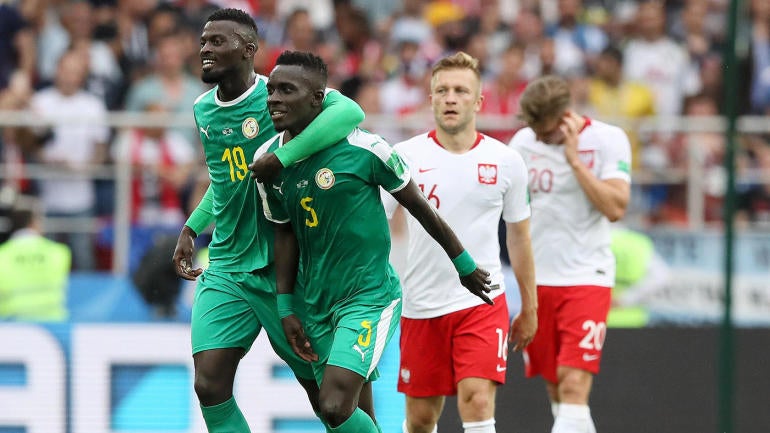I prayed that the World Cup would continue to offer us surprises, and God certainly answered me. Of the three World Cups I have followed, this is certainly the best one, and that's not just because England are in the semifinals for the first time since before I was born (!!!!).
Wow, wow, WOW. Where do we start?
Let's start with the round of 16. Within four hours on a Saturday, Lionel Messi and Cristiano Ronaldo, the two greatest players of this generation, were both sent out. Ronaldo and Portugal crashed out to a clinical Uruguay side, while France put four past Lionel Messi and Argentina to send them out in style. This continued a theme from the group games: the teams that relied too much on one star player were going out. The teams that were staying had unified sides with more than one "star".
The next day brought the biggest upset of this World Cup, as Spain fell to Russia on penalties. I came out of church that morning, looked up the results and reeled in shock. Spain and Russia had gone to penalties! Russia had taken Spain, the 2010 champions, to a penalty shootout. Russia then proceeded to cement my shock by winning said shootout. There has been plenty of shock this World Cup, but this topped it all in my opinion. The lowest-ranked team going into the tournament beat the 2010 World Cup champions, who were favorites to win. It was absolute insanity. (Though honestly, I think I can use the words absolute insanity to describe the entire tournament.)
 |
| Picture from the Times of Israel. |
Less surprising on the same Sunday was Croatia putting Denmark out on penalties. If anything, I was shocked that Denmark even took Croatia that far. Yet again, no team was to be underestimated in this topsy-turvy tournament.
I was very nervous for England going into the round of 16 game. For those who are not familiar with England's recent footballing history, the prevailing theme is disappointment. England had a lot of talent, but after 1990 (the last time they made the semifinals), they could never pull it together. Eventually, the gap between expectation and reality became a source of pressure and fear for England players, to the point where they were at the brink of collapse whenever they played. Whether against a weak team or a strong team, watching England was always a nervy affair and very often a disappointing one. Their performance at Euro 2016 two years ago is the best example of what they'd come to. They barely scraped into the round of 16, where they found none other than Iceland, a country the size of Pittsburgh, PA. When Iceland scored twice in 12 minutes, the team essentially turned into 11 headless chickens, failing to execute any sort of coherent plan and gifting the win to a grateful Iceland team. The fear of failure haunted them throughout that tournament and many others, to the point where the English players literally could not cope with even the slightest danger. These players, who were so talented for their clubs, would mess up for England time after time because the pressure had paralyzed them.
 |
| Terrible memories...Iceland after beating England back in 2016. Pic from The Telegraph. |
After Euro 2016, no one really wanted to manage the England national team. The unenviable job went to a former youth coach, Gareth Southgate. I'm no football analyst, so I can't tell you everything Southgate did right, but there are a couple obvious things. The first thing is that he made England confront their fears. England in particular were very bad at penalty shootouts, so he made his team focus on penalties in order to break that fear. He was also very realistic about his team instead of pouring too much expectation on them, and he chose players based on merit, not their "possible potential" or "history with the team". His team had some stars (Harry Kane and Dele Alli come to mind), but most of the the team were not so well known before the tournament. It helped that the players had grown up playing for England's junior national teams together and were able to put aside club rivalries in order to be a team.
Going into the World Cup, people liked Southgate and the new-look team, but expectations were very low. I was nervous for the Tunisia and Panama games; England had faltered against nations like these. But instead, they won against Tunisia and absolutely crushed Panama. They lost against Belgium, but Belgium are #3 in the world, so no one was disappointed. Their loss also meant that they finished second in the group, so they went into the half of the draw with the lower ranked teams, which was very good in retrospect. But still, they had Colombia to deal with.
Colombia are a very good side, with stars such as James Rodriguez and Radamel Falcao, and most pundits would have favored them to win. But they were not at full strength, and as a result, they mostly tried to defend and play somewhat dirty. The game dragged on with the sides getting one goal each, and it eventually went to penalties, England's old enemy. To my shock, England won the penalty shootout! (They'd been in five penalty shootouts in major tournaments and had never won until then.) As my cousin said after that game, "This World Cup is like a kid in primary school who's been told it's opposite day!"
The magic continued into the quarterfinals, where England played Sweden, who were in the quarterfinals for the very first time. I was fortunate to watch this game live, and it was an exciting one. Sweden were great and fought to the end, but England were the better team, creating most of the chances and scoring twice. It ended 2-0, and for the first time in my lifetime, England were in the semifinals! I'm still wearing my England shirt that I took from my brother four or five years ago. For the first time ever, I'm wearing it with pride. No matter what happens now, this World Cup has made me and many others proud to be England fans again, and for that I have to thank Gareth Southgate and his team!
 |
| Happy times...Dele Alli celebrates after his goal vs. Sweden (NDTV) |
 |
| After winning the penalty shootout vs. Colombia (BBC) |
I watched that game out in the San Fernando Valley, also known as "the Valley", and I stayed around to watch the last quarterfinal, Russia vs. Croatia. As it turns out, the Valley is full of Russians, and several of them showed up to the watch party where I was, shouting chants nonstop for 120 minutes and a penalty shootout.
The game certainly fit the crackling atmosphere. Denis Cheryshev scored a beautiful long-range goal for Russia, but Croatia let them know that it wasn't over just eight minutes later via a header from Andrej Kramaric. In extra time, the roles were reversed; Croatia scored first to go ahead, only for Russia to respond with an incredible header from Mario Fernandes via a corner kick from Artem Dzyuba. They were neck and neck until the penalty shootout, and it was exciting and tiring to watch! I knew Russia's game was over the moment that Fernandes shot his penalty wide. Honestly, though, they have absolutely crushed the expectations and silenced all the haters, and they've done so well just by getting to the quarterfinals.
And honestly, I can say that for almost every team. Sweden weren't even in the World Cup for so many years, but this year they went to the quarterfinals WITHOUT their star player, Zlatan Ibrahimovic. Croatia had been in the World Cup for a while, but they were always crashing out in the group stages. This time they've declared themselves one of the teams of the tournament; not even the hosts, buoyed by an entire nation, could stop them. Belgium have only become good in the past six years or so; their golden generation is finally reaching the heights they're supposed to reach. Japan, who in the past often looked like a waste of a World Cup spot, topped their group and broke into the Round of 16 for the first time in a while. Even Denmark, who crashed out in the round of 16, are better than I can ever remember them being. Almost all the traditional powers are at home watching while the underdogs get to run the tournament, and for that reason, this is my favorite World Cup ever. (Hopefully the next World Cup will involve more African teams, though. Just saying...)
I end this (somewhat biased) review with a shoutout to a Russian player whose name no one knew before this tournament, the aforementioned Denis Cheryshev. Cheryshev plays for a lesser-known Spanish club called Villareal, and prior to this tournament, he was not playing regularly for them. His biggest claim to fame was getting Real Madrid eliminated from an important tournament back in 2015. He has spent the last five years being shuttled between clubs, and he wasn't guaranteed to get into this Russia team for the World Cup. Even then, he was expected to be a fringe player. Instead, he's been the breakout player of the tournament, scoring four gorgeous goals, including this screamer in the Russia-Croatia game just a couple hours before this piece was written.
Six days before this game, he made a post on his Instagram that piqued my interest as I was scrolling through the 'gram today. His Instagram (@cheryshev90) is not particularly interesting, but the caption on his last photo, taken during this World Cup, caught my eye.
The caption reads: "Thank you Lord for everything! Phil 4:13: I can do everything through Jesus Christ #togetherwithmyteam." And it's not just this post; a lot of his posts have the caption "thank you Lord for everything." Is it not like God to lift his people out of the dust like that? As Hannah put it in 1 Samuel 2:
"He raises up the poor from the dust; he lifts the needy from the ash heap to make them sit with princes and inherit a seat of honor. For the pillars of the earth are the Lord's, and on them he has set the world." (1 Samuel 2:8 ESV)
The Bible also says this:
"One who is faithful in a very little is also faithful in much..." (Luke 16:10 ESV)
Cheryshev's previous posts show that he had made a habit of glorifying God in every victory, no matter how many people saw him do it. Now that the whole world can see him, he's decided to continue with what he was doing. Just more proof that God is good to those who serve Him!
ON TO THE SEMIS!










